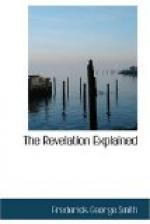Its explanation would seem to be found in connection with certain facts stated respecting the opening of the preceding seals—that voices followed them. When the first four seals were opened, John heard the voices of the four beasts, “as it were a voice of thunder”; and on the opening of the fifth, he heard the souls of the martyrs crying unto God; but when the seventh was opened, there was silence for a time. The contrast is noticeable; but whether it has any special signification, I am unable to say; perhaps not.
Before the sounding of the seven trumpets, the acceptableness of the prayers of the saints is represented by an angel offering incense “upon the golden altar which was before the throne.” This scene was doubtless introduced to lend encouragement to God’s children—that, although iniquity abounded on every side and the judgments of God were poured out upon the people, still the prayers of the faithful few were acceptable in his sight, ascending before the throne like sweet incense from off the golden altar.
After offering up the incense with the prayers of all saints, the same angel took his censer and filled it with fire from off the altar and cast it (the fire) upon the earth—a token of God’s avenging judgments—“and there were voices, and thunderings, and lightnings, and an earthquake.” These, of course, were on earth, and symbolized the revolutions and convulsions now about to take place in the empire.
6. And the seven angels
which had the seven trumpets prepared
themselves to sound.
7. The first angel sounded, and there followed hail and fire mingled with blood, and they were cast upon the earth: and the third part of trees was burnt up, and all green grass was burnt up.
We here enter upon a series of prophecies developing fully the successive steps in the decline of the Western Roman empire, by which it finally tottered to its fall. It was necessary that this persecuting, tyrannical government should be subverted in order to give opportunity for the establishment of apostate Christianity in the form of the Papacy, as it constituted the “let” or hindrance to the full development of the “man of sin” mentioned by the apostle in 2 Thes. 2. That persecuting, Pagan Rome was a serious obstacle confronting the development of apostasy was recognized even by the early Christians. Thus, Tertullian, in his notable Apology, chapter 32, says: “Christians are under a particular




